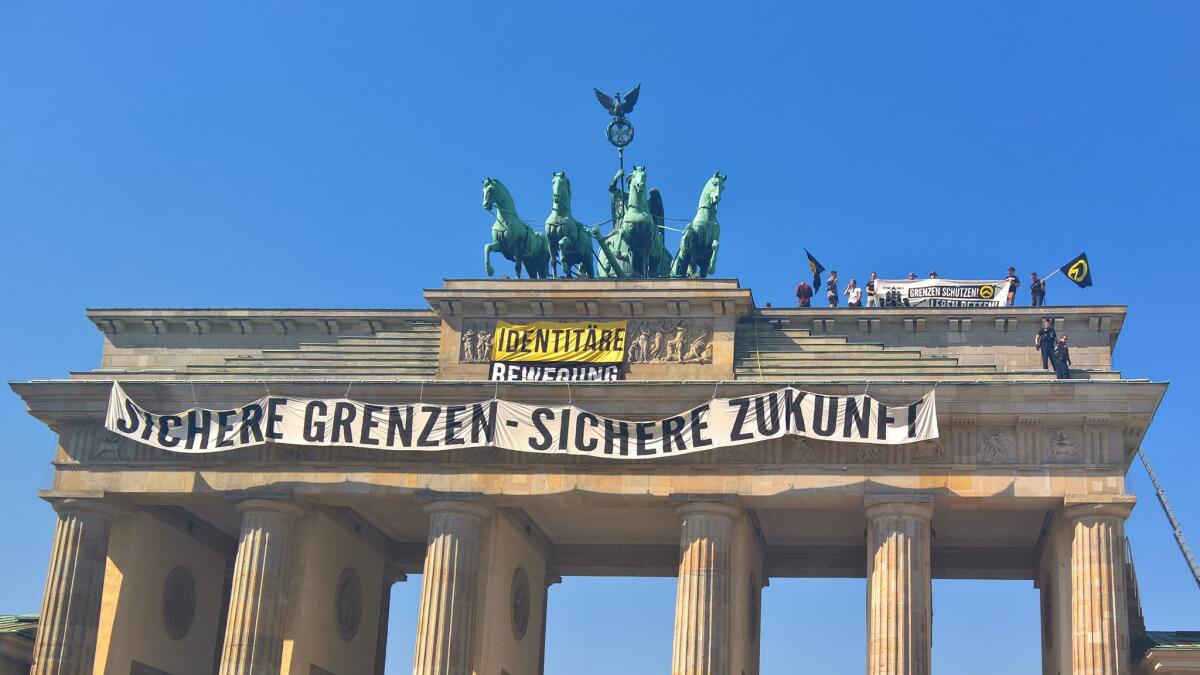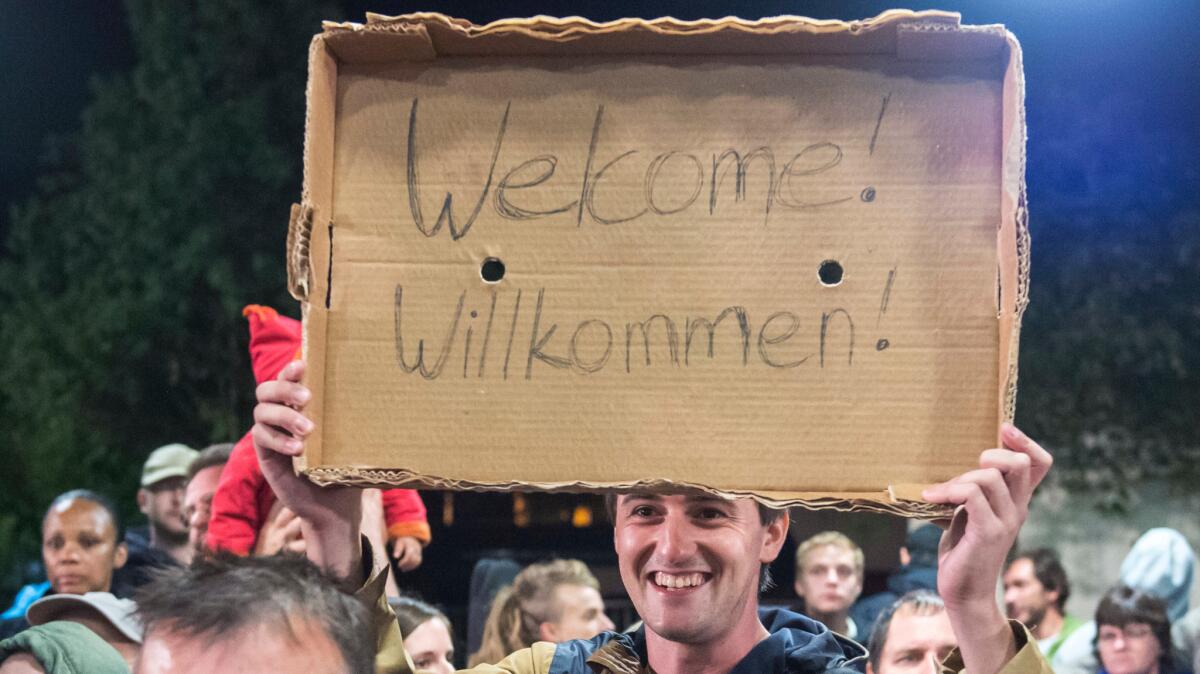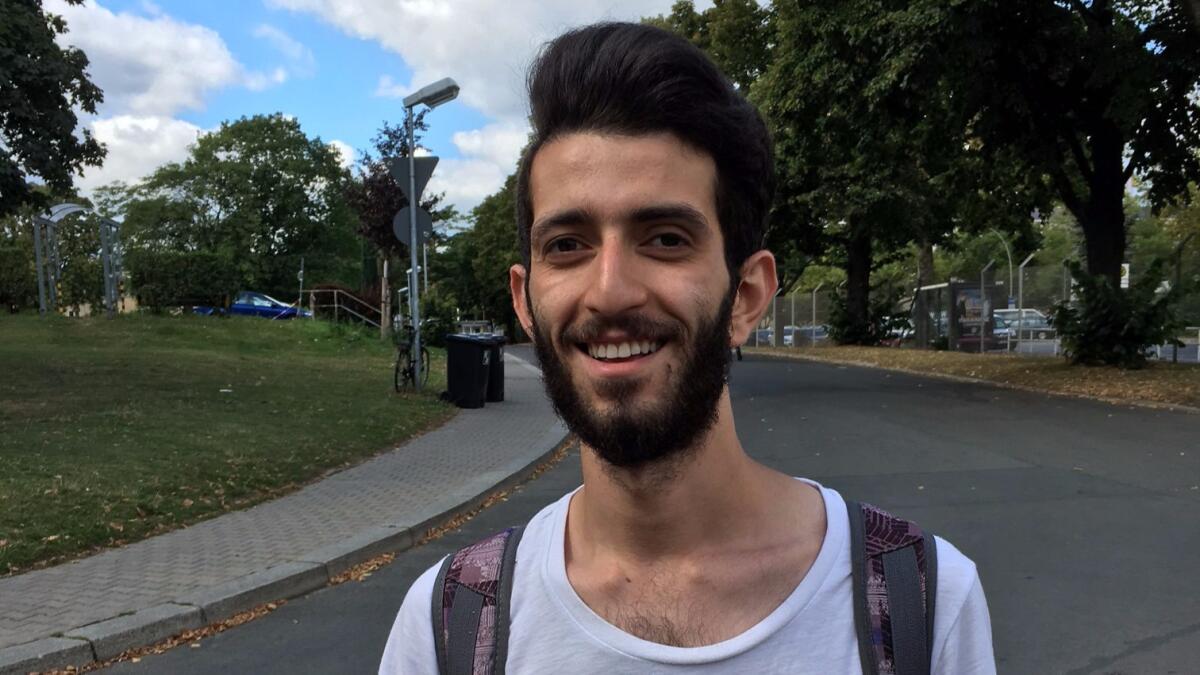Germany opened its doors to refugees a year ago, but some residents have had enough

- Share via
Reporting from Berlin — Anti-refugee activists clad in black quickly scaled the 85-foot-high Brandenburg Gate in the heart of Germany’s capital and attached a giant banner atop the monument reading: “Secure the borders — Secure the future.”
The early-morning takeover of the country’s best-known landmark a week ago didn’t last long: Dozens of heavily armed police brought down the 15 activists after less than an hour. And Berlin Mayor Michael Mueller later called the protest “despicable.”
But the ominous message from the right-wing extremists has been reverberating in Germany. Their bold stunt briefly revived dark memories of the political instability before the Nazi era.
It came as the country is struggling to cope with the arrival of about 1 million refugees after Chancellor Angela Merkel’s controversial decision a year ago to essentially open the borders for migrants fleeing war and turmoil in Syria, Iraq and Afghanistan.
Her conservative party is badly split over her policies and is bracing for potentially heavy defeats in two state elections in large part because an upstart far-right party, Alternative for Germany, has siphoned away large numbers of conservative voters.
Merkel’s conservative Christian Democratic party is forecast to be the big loser in state elections in Mecklenburg-Vorpommern on Sunday and two weeks later in the city-state of Berlin. Such defeats could increase pressure on her to abandon her refusal to introduce limits on the numbers of refugees coming into Germany.
Members of Alternative for Germany and the party’s supporters are upset by what they describe as an an “Islamization” of Germany, a country of 82 million, and critics say they are playing on the public’s xenophobic fears. That anxiety was further exacerbated in July when refugees were involved in two separate Islamic State-inspired terrorist attacks, although the assailants were killed and there were no other fatalities.
Merkel’s approval rating has plunged to a five-year low of 45%, down from 67% a year ago, according to a poll released Friday for the ARD TV network by Infratest Dimap, and her future has become less clear after 11 years in office. Her archconservative Bavarian allies in the Christian Social Union are, at least for now, withholding their backing for her to run for a fourth term in the next election for chancellor in September 2017.
A national poll released by the Forsa Institute on Wednesday found that only 33% of voters support Merkel’s party and its CSU allies, down from 41% a year ago.

Merkel’s pro-refugee policies have also exposed rifts in the European Union, where countries have resisted taking in refugees though many EU leaders made announcements deploring the deaths of thousands who drown attempting to cross the Mediterranean Sea to Europe.
The narrow victory in June for voters in Britain who favored leaving the EU was due in part to Merkel’s welcoming of refugees, some analysts said. The surge of refugees into Germany last year, they said, bolstered fears in Britain that the country could be overrun by foreigners.
“From a moral point of view, Merkel may have done Germany a great service, but she has rubbed a lot of people here and across Europe the wrong way by forging ahead on her own by taking in so many refugees without a real plan,” said Hans Vorlaender, a political scientist at Dresden’s Technical University.
Among the concerns in Germany are that Merkel’s government has allowed too many refugees to come into the country too quickly and that newcomers may claim low-cost housing and low-skilled jobs that should be available to Germans. Some citizens also worry that helping refugees will be costly to taxpayers, and that the refugees, who are 70% Muslim, will change the predominantly Christian culture.
Merkel has steadfastly opposed demands to introduce an upper limit on the numbers of refugees arriving and insists that Germany “can do it” when it comes to handling the influx.
“The numbers of doubters in her own party are growing by the day, and it’s possible that roughly half the conservative members in Parliament don’t want to follow her on this path anymore,” said Gero Neugebauer, a political scientist at Berlin’s Free University.
A year ago conditions did not seem anywhere near as dire. Thousands of Germans were at the Munich train station, the first point of entry for refugees who had been stranded in distressing conditions in Budapest, Hungary, for weeks, and at border crossings handing out food, water and clothing and cheering.
There had been a lot of empathy in part because many millions of Germans had arrived in earlier waves of displaced people after World War II, or refugees from the communist East Bloc during the Cold War, or ethnic Germans or Jews after the fall of the Berlin Wall.
Merkel’s popularity soared in light of her leadership and humanity, and she seemed to be sending signals to invite even more migrants to make their way to Germany by posing for selfies with several refugees at their new temporary quarters.
Rodin Saouan became briefly famous in the Arab world for the selfie he took with Merkel days after arriving in Berlin.
“I thought it was something normal. I sent the picture home to my parents,” Saouan, a 26-year-old farmer from outside Damascus, Syria, said in a recent interview. “It was like telling them ‘Look, I’m with Merkel, I’m safe here in Germany.’”
But the euphoria in Germany and for refugees such as Saouan soon began to fade as the numbers soared and troubles mounted.
The tide turned on New Year’s Eve when, according to police reports, more than 1,200 women were abused and sexually assaulted across Germany by thousands of foreign men. Most of the victims — about 600 — were in Cologne, Germany’s fourth-largest city.
The attacks triggered a storm of protest in Germany and instantly raised doubts about Merkel’s policies, leading to some deterioration in support for refugees.
Saouan, nevertheless, learned to speak passable German after spending 20 hours a week in a language course and is looking for a job. He said he fled his home near Damascus last year because he was afraid he’d end up in the army and have to kill others — or be killed himself.
“I didn’t have a future there,” he said. “But it looks like I might not have a future in Germany either. It’s become very difficult for me here.”
Tarik Bashir, a 25-year-old from Damascus, said he arrived nine months ago and has been stuck with thousands of others at a giant refugee center in a vacant and drafty hangar at the former Tempelhof Airport.
“At first I really liked Germany, but things are going downhill,” Bashir said. “The food is bad, the sleeping situation is bad. The German people aren’t friendly. Everything is bad at Tempelhof.”
Several refugees in Berlin said they sensed a shifting sentiment in Germany, although they said they were still glad to be living in the country’s biggest city. They said they like being in one of Europe’s most multicultural capitals and not in a small provincial region like many of their compatriots.

Hamza Dalawi, who arrived a year ago from Baghdad, said he feels born again in Germany and is trying to learn the language. He said he hopes to pass a test for his crane operator license.
“It’s really good here,” said Dalawi, 23, who found a part-time job helping haul away junk. “In Iraq, it was bombs every day. There aren’t any bombs to worry about here.”
For Feras Homsy, the focus has been on spending several hours each day at a Berlin library studying German.
“I’d like to find a job as a manager in Germany one day and know that German is the key for that, so that’s why I’m working on it every day,” said Homsy, a 24-year-old from Damascus. “I’d like to stay in Germany.”
Kirschbaum is a special correspondent.
ALSO
Obama makes progress on climate change, the bright spot in his China policy
Philippine leader declares ‘state of lawlessness’ after deadly market bombing
As Uzbekistan’s longtime strongman is laid to rest, rumors swirl about a successor
More to Read
Sign up for Essential California
The most important California stories and recommendations in your inbox every morning.
You may occasionally receive promotional content from the Los Angeles Times.













